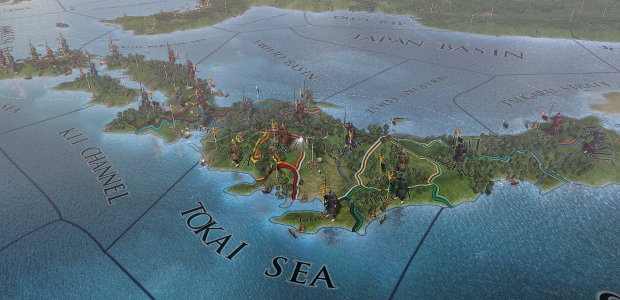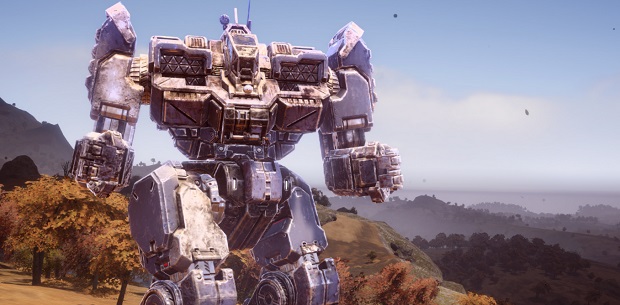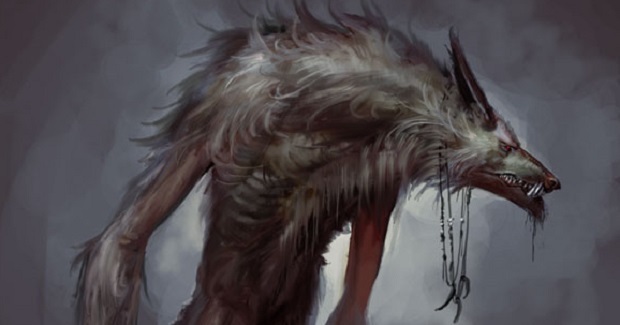Paradox on the future of historical strategy, RPGs and their internal development studio
"The next Crusader Kings could be an RPG"
At the Paradox Convention last month, I was hoping to see something new from Paradox Development Studio, the internal team responsible for the company's core strategy titles. There were new expansions for Europa Universalis IV [official site] and Hearts of Iron IV [official site], and the hiring of Jon Shafer is an interesting move, but no actual games were announced. I sat down with creative director Johan Andersson and CEO Fredrik Wester about the possibility of a Crusader Kings [official site] sequel, the expansion model, and what the future holds for the development side of Paradox.
The convention was open to the public this year, for the first time, bringing in hundreds of fans from around Europe and the world. There were talks from developers, live performances of medieval music, open air bars and barbecues in an unseasonally chilly Stockholm, and, of course, games. In the courtyard of Gamla Riksarkivet, the 19th century former National Archives that hosted the event, people played boardgames, while inside there were LAN events for Hearts of Iron and Europa Universalis, as well as competitive matches of Steel Division.
Previously, these annual conventions have been press events. Hosting a gathering with hundreds of fans is a very different proposition and it's a sign of Paradox's growth, both in popularity and as an entity, that an event on this scale is possible. In the six years that I've been covering Paradox, I've seen a lot of changes in the company as well as the conventions, and most have been on the publishing side. From A Game of Dwarves and Dungeonland to Pillars of Eternity and Cities: Skylines.
The way that past mistakes and experiments have informed the current approach to publishing is interesting, and I may cover that in more detail elsewhere, but first I want to look at what has seemed the more stable and unchanging part of the company: the grand strategy titles that have been the foundation and core of the internal development studio. With Crusader Kings II now five years old and twelve expansions deep, and Europa Universalis IV a relatively sprightly four years and ten expansions, what is the future of these titles? At what point are they done and at what point does the thought of a sequel come up.
Johan Andersson is a designer, primarily on Europa Universalis, and the manager of the Paradox Development Studio. I asked him, first of all, whether he and his teams were already thinking about sequels, and if so how they'd avoid cutting out content that had been added through DLC, following what I refer to as The Sims Problem, whereby a sequel is less than the sum of its predecessor's parts.
When will Crusader Kings and Europa Universalis, in their current incarnations, be finished?
“There are two driving forces. One is the creative force; what do we want to do? The other is a business force; as long as the amount of people playing keeps growing, we're making more money, and that means, from a business perspective, we shouldn't stop making new expansions.
“But if we don't have good ideas and the things we make aren't good enough, then it's time to move on to something new. So we have the business force that tells us our current approach is a super-smart financial decision, but the creative drive is still there because there are lots of cool things that we still want to put into the games. So I can't say when any game will be finished because we don't know.”
And as for the question of whether there will ever be a Crusader Kings III, the answer is a simple “maybe”. I ask Andersson to elaborate, since the numbering of EU, Hearts of Iron and CK suggests sequels are very much part of the design process at Paradox.
“There would have to be a reason to make sequels, and a killer unique selling point. We wouldn't make a sequel just for the sake of it. Updated graphics would not be a selling point in itself. It has to have a reason to exist, and we need to feel we can't make those changes in the existing titles.
“Some things that I've been toying with in EU IV involve streamlining. We have estates, we have legitimacy, we have stability, we have corruption - how can we make all of that more streamlined? Less figures to keep track of, but a more complex model. We'd be cutting away stuff, but we wouldn't be removing content. Those are things that should be done when, or if, we make a sequel.
“But we wouldn't make EU V just for the sake of it. There's no cut-off point when we would automatically move on to a sequel.
“I don't think it's a foregone conclusion that it's a good idea to make a sequel. We've spent a lot of effort building a development process that allows us to make profitable, regular expansions, and the number of users keeps growing. We're close to four years with EU IV, five and a half on CK II, and that graph is still growing.
This leads me back to a theory I've mentioned on these pages before; that Paradox games eventually become their own sequels. Andersson agrees.
“Yeah. If you're comparing EU IV today to the game at release, we've done much more work than between EU I and II. We'd be at EU XII.”
Andersson's role has evolved over the years. In fact, there's been an abrupt change after years of gradual evolution. Three years ago, I spoke to CEO Fred Wester about his own role at the company and he admitted that he wasn't particularly happy with certain aspects of his job. The company was growing and had stopped being a Cheers-like environment where everybody knows your name. Growth was good, Wester believed, but it had to be handled correctly, and he wasn't entirely sure what his role should be in encouraging growth while also facilitating healthy intake of new staff.
It's worth going back to both Wester and Andersson's first involvement with the company to understand how their positions have changed. Wester likes to tell stories of the early days, when Paradox had a handful of staff and everyone pitched in to put manuals and discs into boxes when the time came to ship a game. Andersson was already in place when Wester arrived, having spent three years at Funcom after dropping out of university in 1994.
“...in '97 I made my own company with a bunch of friends, now scattered all over the world, from IO to all over the US. We were bad at selling things though so we ran out of money before the game was finished," says Andersson.
“It was a two person action game inspired by Tomb Raider - it was '97 after all - and you had two characters and had to solve puzzles in a 3d world. You had a slave and a harem girl and you started by escaping a palace that you were trapped in. The slave was strong and the girl was nimble. It was interesting to make but we didn't sign contracts, we ran out of money, and in January '98 I thought fuck it, I'll move back to Stockholm. And I applied to work at Target because they were working on a historical strategy game called Europa Universalis.
“I was senior programmer there and when that company downsized I was the only one left around. I finished it basically by myself.”
Target was a Swedish tabletop game publisher, from which the core of Paradox formed. Wester came along some years later, initially brought on as a consultant. He's responsible for pushing the company into digital distribution and for taking risks on the publishing side.
“Fred is a risk taker,” Andersson tells me. “That's how we grew so much.”
Not because of the relative accessibility of Crusader Kings II, the RPG-strategy hybrid, or the success of third-party titles like Magicka?
“That too, but we needed to take risks.”
Half an hour later, when Andersson had been pulled into other interview duties, I asked Wester if he considered himself a risk taker.
“Yes. I get bored otherwise.”
I've known Wester for five years so I'm familiar with the way he'll often glance around the room, distracted, during an interview or informal conversation. He's always looking for something else, which isn't to say he's not interested in what's already happening; I get the impression he'd happily multi-task his way through life. In fact, when he arrived at the fanfest, organised by his own company and for their fans and the press, he was running slightly late because he'd been coaching a youth football team.
“We won 17-0. They're often better than the other teams because they train a lot.” He laughs at this, aware that his approach to coaching is probably as absurdly over-energised as most things he turns his hand to.
One of the creative forces within Paradox once told me that Wester's biggest problem, as a boss, is that he can't keep himself from interfering. Not a single project existed – and this was four years ago – that Wester wouldn't want to poke at and influence in some way. “He tells us we need to fence ourselves off so we can have some privacy and get on with work but he just sticks his head over the fence.”
This wasn't a complaint so much as a smiling acknowledgement of Wester's character and when I told him about it at the time, he found it hilarious: “Well, then they need to build taller fences!”
I mentioned this conversation to him at the convention couple of weeks ago and though he didn't remember it, he did say his creative influence is effectively zero now - “nobody listens to me, and that's a good thing!” - but he exerts influence in other ways. The purchase of White Wolf, for example. He is fond of the company and their stories, as well as some of the people there who he describes as “the best”, and I wondered if the decision to invest so much money had been purely business.
“Fifty percent business, fifty percent heart.” The percentages are clearly variable – he instantly pulls back to 80/20, then 70/30 – but there is a definite element of fandom and enthusiasm involved. Less 'the art of the deal' and more 'dealing with feeling'. And that's the thing about Wester – he's clearly a smart businessman, a risk-taker and the rest of it, but he's also somebody who seems to have an almost infinite reservoir of time in which to actually play games.
I asked him what his favourite game of all time was and he barely missed a beat before saying, “Pools of Radiance and Ultima IV.”
Favourite Paradox game? “Crusader Kings II.”
Death-row meal? “Pasta. No wait. Pasta and ice-cream.” So much for the risk-taking.
Wester seems more engaged than I've seen him in recent years. He's proud of the publishing arm of Paradox, and working with companies like White Wolf, Obsidian and Harebrained Schemes gives him a buzz. Again, it's the heart and the head working together; these are people making games that he wants to play as well as to represent.
Andersson reckons Paradox needed Wester and Wester knows that he needs his coders and creatives, but that doesn't get me any closer to understanding what the future might hold for the Development Studio and its major grand strategy franchises.
“The next Crusader Kings could be an RPG,” says Wester. “I don't know if that's what it will be, but it could be. That would make sense.”
Andersson, meanwhile, is sticking to his guns: sequels are not necessary and not necessarily a good thing at all. He's happier in his new role as well though, and explains how the studio has been reconfigured.
“We reorganised the studio around two years ago when I didn't want to be administrative executive manager of everything. So I found someone to do my job and I became lead of the creative side. Thomas [Johansson] is leader of execution - programmers, artists, content designers etc. Then we have a head of verification: QA etc.
“So the people I lead are the creatives: game directors and art directors. The game directors want to make new games; that is fun. But we also have people who just want to tinker and improve existing games. Look at people like Martin [Anward] on Stellaris - he wants to come up with new ideas and have people playing them the next day. We can implement ideas so quickly and show them to people.
“With a new game it takes so many years until you have something to show. That instant gratification that comes from working with a game for years and implementing new things quickly triggers a lot in some individuals and our game directors thrive on those aspects.”
As for Andersson himself, he still dreams of making an RPG and reckons that the new work systems in place, and the better control within the studio, would help to avoid a Runemaster situation. Runemaster would have taken place across the worlds of Nordic mythology and though early ideas were shown and discussed at press events in the past, the game was cancelled in 2014.
Wester says new ideas are often attempted and then scrapped, but Paradox have learned not to talk about them publicly until they're certain the core pillars are fun, and that the design has come along far enough to be a sure thing. There will be an RPG at some point, that is clear, but when I mention the possibility of a Paradox-developed White Wolf RPG to Wester and Johansson I get very different responses. Wester: “Well, as we know, these things take a lot of time so I have nothing to tell you. Yet.” Andersson: “I would still love to make an RPG. Not White Wolf though. I don't like those kind of stories. I'm more a straight-up fantasy person.”
So what would a Johan Andersson RPG look like?
“I don't want to read a lot of text - tldr - I like action combat, like Diablo. The concept of Diablo combat - but I want it to be twice the speed, with more reaction. I don't like the combat in BioWare games though. I also don't like all of this casual teleportation and fast travel.
“I love the concept of games like Witcher and Skyrim, but there's something with open worlds that kind of drives me insane.”
Andersson tells me there are three games he wants to make before retiring – a grand strategy game (DONE), an RPG (probably in the works) and... a football management game.
“When I was a teenager, on the C64, I made so many cool games for myself. A Ports of Gold clone, a strategy game simulating the Great Nordic War, a Formula One management game. I learned to code when I was twelve or thirteen. There was a manual for the C64 that taught Basic, and I had a friend and she had learned to code from her father and she taught me how these things worked.
“But one of the first games I made was a football manager game. As we've talked about before, I love Football Manager, or Championship Manager as it used to be called. There was a basic management game on the C64, very basic, and it took forever to sort the table after a round of matches.
“I got irritated because if your team was too good and scored too many goals in a game – I think it was seven – it would wrap back round to zero. So I coded my own football management game. This must have been before the Premier League because I called it Divison One. It must have been 1990 or 1991. I remember Blackburn were coded to be good so it must have been a long, long time ago. I even made my own window system so you could have proper windows that popped up on the C64!”
I tend to think of Andersson and the people around him as historical strategy designers, to the exclusion of just about everything else. Of the three games on his bucket list, Andersson has only really tackled the grand strategy game though, so maybe the future won't be sequels, but entirely new worlds.














